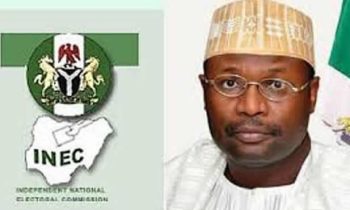
***says more parties likely to be registered
***2023 polls not do or die affair, says NIPSS DG
Ahead of the 2023 general elections, the Independent National Electoral Commission (INEC) has expressed concern over “some gaps” and the way political parties conduct themselves saying there should be improvement.
Among those gaps included the lack of internal party democracy, inclusivity, marginalisation of women and Persons Living With Disabilities and the youths.
While expressing hope that it would register more parties before the next general election, the commission said it had put trust in God that the challenges in Nigeria would not be a threat to the 2023 election.
The chairman of INEC, Prof. Mahmood Yakubu, represented by its National Commissioner and chairman (Outreach and Partnership Committee), Dr. Adekunle Ogunmola, stated these in Abuja weekend during the annual summit of political parties and stakeholders with the theme: “Political parties and democratic stability in Nigeria: Setting agenda for 2023 general elections.”
The aim of the summit, was to set the agenda for the 2023 election and to educate political parties about 2023.
The programme was organised by the National Institute for Policy and Strategic Studies in Kuru, Jos in partnership with the European Union; Political Parties Leadership and Policy Development Centre; EU Funded Programme, Support to Democratic Governance in Nigeria and other partners.
During the event, the Director-General of NIPSS, Brig. General Chukwuemeka Udaya (retd.), called on politicians to know that as 2023 beckons, “elections is not a do or die affair.”
He said, “Annually, ECES trains political parties and the whole essence of this particular summit is to set the agenda for the 2023 election and to educate political parties that come 2023, it is not a do or die affair. It is all about political inclusion, democracy and governance for Nigeria.
“What we want political parties to take home from this training and summit is for all Nigerians to reduce the divisions; there are deep divisions and it is the responsibility of the political parties to bring the country together, forge the country on and set agenda for elections come 2023.
“The agenda are clear, there are security issues, there are economic issues and these are the things we want political parties to discuss come 2023.”
Ogunmola said, “I think this kind of summit is important in the sense we had appraised the political situation in the country with the way the political parties play their roles and we found some gaps that we need to fill and that is the purpose of this type of summit, so that what they are able to gain from here, the capitalize it and improve the polity.
“There are several gaps like internal party democracy, inclusivity; the need for more women to be involved, the need for the youths to be involved; the need for PWDs to also be involved, not only as voters or party members but as leaders of political parties and also as elected representatives of political parties.”
He also spoke on the possibility of registering more parties before 2023 and why the commission had put its trust in God despite the challenges in the country.
“Well, there is nothing in our books that says we should not continue to register political parties provided they meet the requirements. So as many associations that are desirous of getting registered, INEC will be prepared to register them except they fail to meet the requirements.
“Our trust is in God, we have had similar situations in the past and we have been able to overcome and we do hope that this time around, the 2023 election will be far better than previous elections”, he said.
The Project Coordinator of Europeean Centre for Electoral Support, Hamza Fassi-Fihri, said the annual summit of political parties was really important as it affords the parties in Nigeria “the opportunity to gather and discuss issues of common interest not only for them but for all Nigerians because the political framework in Nigeria and by virtue on the constitution the political parties are the only institutions recognized to have the ability to nominate candidates for political office.”
“So political parties are the interface between citizens and their representative institution in the country; so it is important for political parties not only to be aware of this responsibility but to do everything they can do to be close to the citizens, to allow citizens have this participation guaranteed and to ensure inclusivity in the political electoral processes”, he emphasised.
The chairman of Inter-Party Advisory Council, Dr. Leonard Nzenwa, said one of the key agenda of the organisation would be “to make sure that the internal democracy that will lead to the emergence of candidates are done better this time around.”
He said, “We know that most of the internal primaries we have had in the last few weeks, few years, has been much more precarious; but this time, we are working to see how we can have a much more democratic, acceptable and a unifying primaries that will now lead to the emergency of credible candidates for all the various elections.
“Now that is the key thing because once we have a credible internal primaries in place, it will help a long way to reduce the tensions and divisions that inherent in each of the political parties.”
“We need to understand that when we have one, two or three persons in a setting, there is bound to be misunderstanding, miscommunication, there is bound to some differences in opinion and all that and different world view, so we are expected to see this kind of things.
“But the most important thing is how you use these differences, these diversities in a more productive way to energize the system, political parties in this context to have a better polity and make the political parties more better and more valued for our Nigerian society.”




